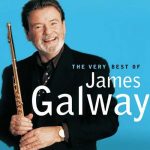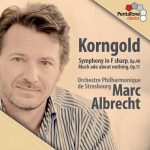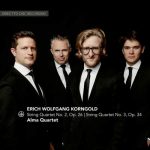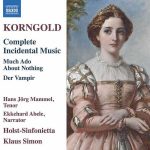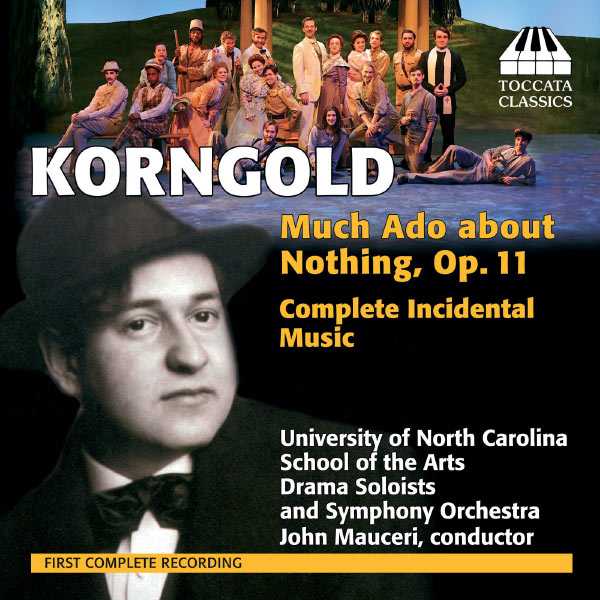
Composer: Erich Wolfgang Korngold
Orchestra: University of North Carolina School of the Arts Symphony Orchestra
Conductor: John Mauceri
Format: FLAC (tracks)
Label: Toccata
Catalogue: TOCC0160
Release: 2013
Size: 264 MB
Recovery: +3%
Scan: yes
Much Ado about Nothing, Op. 11 (new complete edition)
01. Ouverture
02. Act I Scene 1: Kriegsmusik (War Music)
03. Act I Scene 2: Don Juan (Don John)
04. Act II: Prelude, “Mummenschanz” (Hornpipe)
05. Act II Scene 1: Festmusik (Festive Music) (Beatrice, Benedict, Claudio, Hero, Leonato, Don Pedro, Balthasar, Antonio, Don John, Margaret, Ursula)
06. Act II: [Change of Scene]
07. Act II Scene 2: Don Juan (Don John, Borachio)
08. Act III: Prelude, “‘Gartenmusik” (Garden Music) (Benedict)
09. Act III Scene 1: Lied des Balthasar (Balthasar’s Song) (Benedict, Don Pedro, Balthasar)
10. Act III Scene 1: Intermezzo (Beatrice)
11. Act III Scene 3: Holzapfel und Schlehwein (Marsch der Wache) (Dogberry and Verges (March of the Watch))
12. Act IV: Prelude, “Madchen im Brautgemach” (Maiden in the Bridal Chamber)
13. Act IV Scene 2: Kirchenszene (Church Scene)
14. Act IV Scene 2: Gerichtszene (Judgement Scene)
15. Act V: Prelude, “Trauermusik” (Funeral Music) (Claudio)
16. Act V: [Change of Scene] (Don Pedro)
17. Act V Scene 4: Intermezzo, “Final Wedding Scene” (Beatrice, Benedict, Claudio, Hero, Leonato, Antonio, Friar Francis)
18. Act V Scene 4: Schlusstanz (Final Dance) (Benedict)
Much Ado about Nothing, Op. 11 (published version)
19. IV. Festmusik
20. VI. Gartenmusik
21. VII. Intermezzo
22. XII. Trauermusik
23. XIV. Schlusstanz
Korngold’s incidental music for Shakespeare’s comedy Much Ado about Nothing, premiered in Vienna in 1920, enjoyed instant success and soon spread round the world in a series of arrangements that are still performed today. The music has not been heard as Korngold intended since that first production. For this recording, made in conjunction with its fully staged US premiere, Korngold’s complete score was reconstructed from the original Viennese materials. A recent ‘complete recording’ omitted a number of cues, reconstructed for this recording for the Vienna materials. Korngold’s family made his own recordings available so that these 21st-century performers could study the composer’s own approach to the music. For the first time on CD, the music is played here by the chamber-orchestral forces for which it was written. This recording includes Shakespeare’s spoken dialogue where Korngold intended it to be heard over the music but also present the music in separate tracks without voices.
The incidental music Erich Wolfgang Korngold composed for Shakespeare’s Much Ado about Nothing has usually appeared on CD as a suite of five-to-seven selected pieces, but it is seldom presented complete with spoken dialogue. John Mauceri’s album of the reconstructed work, performed by the University of North Carolina School of the Arts Drama Soloists and Symphony Orchestra, is about as thorough as can be imagined, for not only are the pieces that constitute the published version included, along with spoken parts, but scene change music and two additional pieces, the War Music and the Judgement Scene, have been restored and recorded for the first time. Stylistically, Korngold’s music is typical of Viennese theater music of the 1920s, and it sounds effervescent, warm, and lush, even though the scoring is for a small chamber orchestra. Mauceri and his musicians play the music much as it was first heard, because the reconstituted score was made from facsimiles of the original parts and the conductor’s score, and tempos and other decisions were based on markings in the parts and Korngold’s own recordings of the music. One might wish that a complete performance of the play with the music had been recorded in order to make sense of the whole story with the pieces heard in context. Understanding the significance of the fragmentary scenes offered here requires a prior reading. Even so, the actors and musicians are enthusiastic and engaging, and the production is quite polished for a university level performance, fitting the music with a precision that’s almost professional and a spontaneity that seems effortless.
